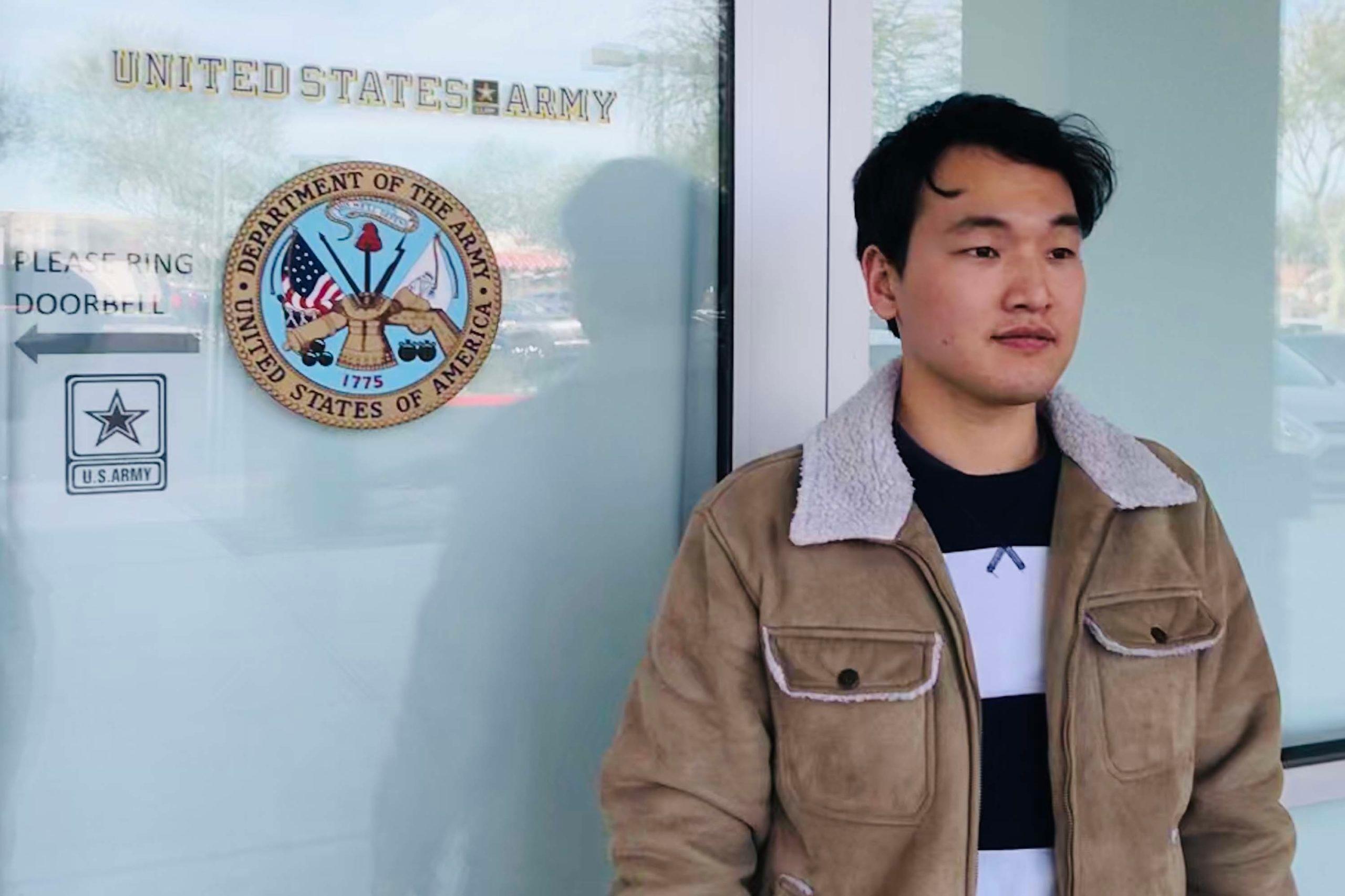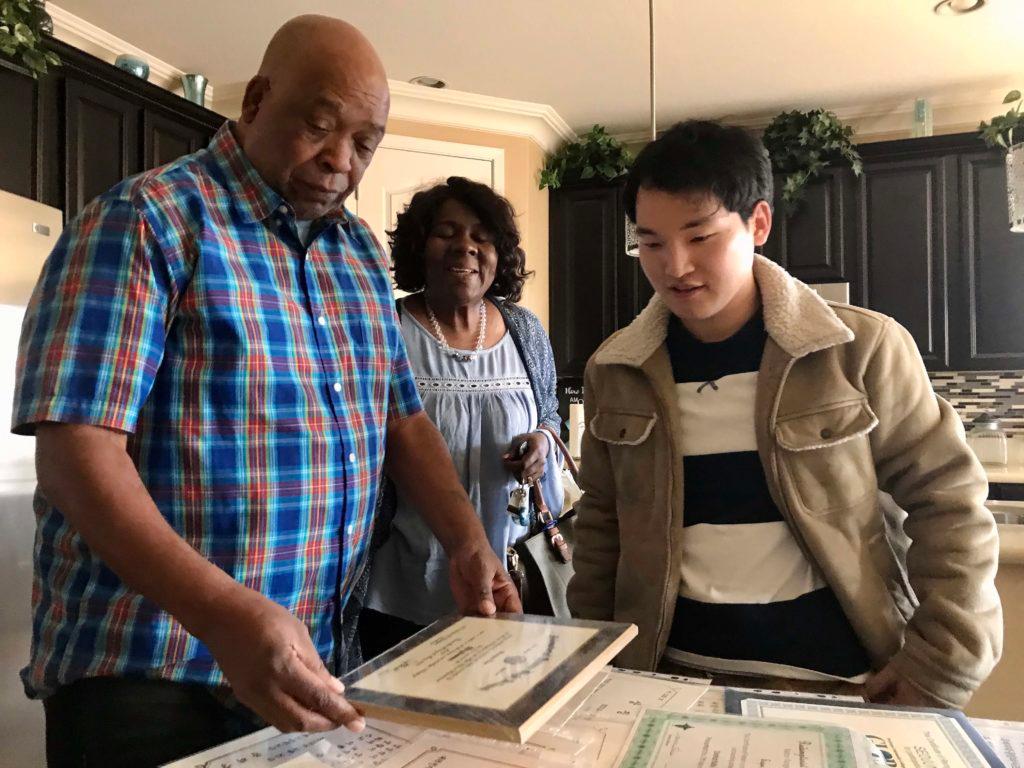
At an Army recruiting station in the Phoenix suburbs, Seojun Lee pointed to a wall of photos of his fellow military recruits.
One woman he befriended is now a medic. Another man who was "super motivated all the time" became a combat engineer.
Lee's photo is there too. But more than four years after the South Korean national signed up for the U.S. Army, he hasn't been able to serve.
"I was supposed to go with them together, and I'm still here alone," Lee said. "Everybody left me. It's quite sad."
Lee is one of the hundreds of immigrants fighting to be admitted into the U.S. armed forces. The government recruited them into a program called Military Accessions Vital to the National Interest. The program, which was started by the Bush Administration in 2008, targeted non-citizens with skills the military needed, such as medical training or expertise in certain foreign languages.
To make the program more appealing to immigrants, MAVNI recruits were told they would be fast-tracked to become U.S. citizens.
But the MAVNI program has been beset by security concerns for years. In 2010, it was suspended for three years because of questions about how recruits were vetted. In 2016, the Obama Administration stopped taking new MAVNI applicants, citing concerns about the program's vulnerability to espionage.
After President Donald Trump took office, the Pentagon clamped down harder, mandating tighter screening of recruits who had already been accepted. Some were discharged, while others, such as Lee, have been stuck in limbo, waiting years for the government to complete background investigations or resolve other issues.
"They have effectively killed the MAVNI program by imposing all kinds of delays and arbitrary reasons for denial," said Stephen Yale-Loehr, who teaches immigration law at Cornell University.
Recruits face red flags about their overseas background
Lee, who has been attending college outside Phoenix, said he is perplexed. He said there's nothing suspicious in his background or his family's. In his hometown of Daejeon, South Korea, his mom is a nurse. His dad is a plumber.
Lee said he has admired the U.S. since he watched "Top Gun" as a child and looked forward to becoming naturalized within months of enlisting in exchange for his Korean language skills.
"I had a great feeling and good perspective on United States government," Lee said.
Lee first came to the U.S. as a foreign exchange student in 2013 on a student visa. He said he had been a poor student in middle school, so his mother scrounged the money together to send him to the U.S. to try to turn around his academic career.
While in high school in Baton Rouge, La., he joined the Junior ROTC.
"Every event that we had, Seojun Lee was there: color Guard, drill team, rifle team, said his ROTC instructor, retired Army Lt. Col. James Gardner. "He was an excellent shooter."
It was an Army recruiter who convinced him to join MAVNI.

But after Lee was sworn into the Army in January 2016, his ship date to basic training got postponed. Then it happened again. And again.
The military notified Lee that he posed a moderate security risk, in part because his parents provide financial support from South Korea -- which Lee said hasn't been true for years. Another red flag for screeners was that Lee's relatives had served in the South Korean military. Lee said that's true, but service is mandatory for men there.
"Sometimes I think if all this thing was just a dream, and I'm the one who is crazy," Lee said.
Some recruits go to court
While the U.S. government has accused several MAVNI recruits of suspicious behavior, Professor Yale-Loehr said he's mystified by how the larger group is being treated.
"Given the tight labor market generally in the United States and the problems that the military is having in meeting its recruiting goals, foreign nationals are an important component to our military," Yale-Loehr said.
A Pentagon spokeswoman called the vetting process "essential to national security" and time-consuming because the military has "limited ability to verify information" in some recruits' home countries.
"It's better safe than sorry, quite frankly," said Mark Krikorian, who leads the Center for Immigration Studies, which supports tighter controls on immigration.
Krikorian said too many immigrants had been treating MAVNI as an easy shortcut to citizenship.
"MAVNI just turned into just another way of immigrating to the United States instead of a very select, very targeted program for a handful of really high-value people," Krikorian said.
Some rejected MAVNI recruits have challenged the military's decisions in court and been reinstated. Seojun Lee hasn't done that, but he is trying to get the military to take him back. Among those supporting Lee are his former JROTC instructor, James Gardner, who now lives in Arizona and is providing Lee a free place to live as he attends college.
"We keep a sense of humor and try to keep him positive," said Gardner's partner, Beverly Meeks, who calls Lee a surrogate son. "It's going to work out, I think."
"I know it will," Gardner said.
Lee has now lived with the couple for about four years. He said it's funny to think that he shares a roof with a former military officer.
"If I did something suspicious, he's the first one who would report me," Lee said. "It's kind of ridiculous."
This story was produced by the American Homefront Project, a public media collaboration that reports on American military life and veterans. Funding comes from the Corporation for Public Broadcasting.
Copyright 2020 North Carolina Public Radio – WUNC. To see more, visit North Carolina Public Radio – WUNC.

9(MDEyMDcxNjYwMDEzNzc2MTQzNDNiY2I3ZA004))








